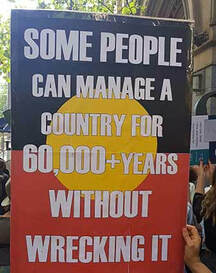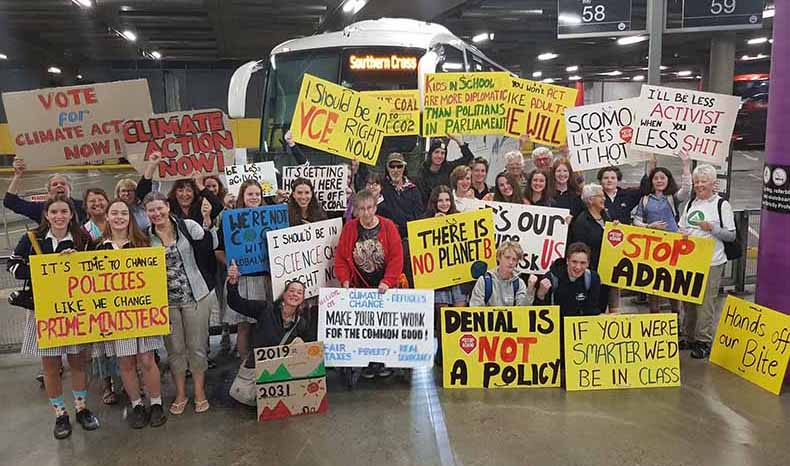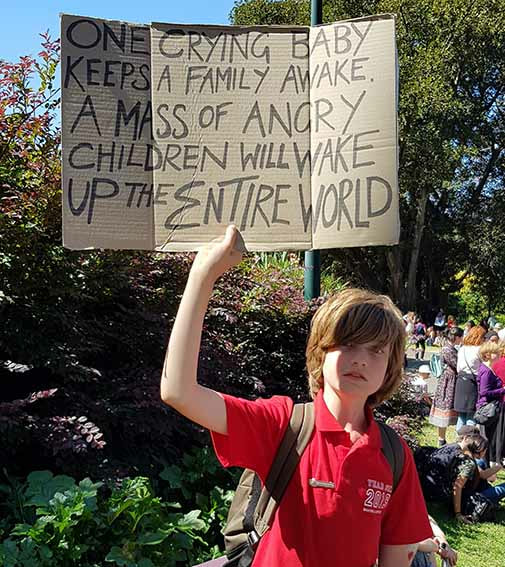On March 15, strike action was taken by over 30,000 students in Melbourne calling for political action on climate change. They were joined by more than 150,000 people Australia-wide and over one million worldwide.
The students took a day out from school to make their collective voice heard, saying not enough is being done to keep global temperature increases below 1.5 degrees Celsius, the point at which science tells us runaway climate change is the most likely outcome.
| My friends and I marched with our children. We started as a group of five and ended up filling a 45-seater bus travelling to Melbourne from the Bass Coast. We arrived at Southern Cross Station around 10.30am, as did hundreds of others from regional Victoria and we gathered together before marching up Collins Street to Treasury. An observer may have assumed that we co-ordinated our arrivals, but it was simply chance driven by a common purpose. As we marched along the footpath bystanders smiled, waved, took photos, some beeped horns and cheered, some showed strong emotion, even tears. Yet others felt compelled to shout aggressively “You kids should be in school!” Before I could express my outrage, the students were quick to respond, holding high their banners with great catchphrases like “System-wide change, not apathy”, “Denial is not a policy” and chanting “Coal don’t dig it, leave it in the ground, it’s time to get with it”. The enthusiasm and energy in the chanting was infectious and my friends and I were soon in full voice, in solidarity with these young leaders as we marched to the top end of town. We were 500 strong marching up Collins Street, arriving at Treasury to loud applause by a crowd that covered the steps and spilled across the entire intersection of Collins and Spring streets. Within 30 minutes we were at least 30,000 strong. Other estimates had us at 40,000. | “The whole day left me empowered and hopeful. Surely a change will happen soon.” Isabel Rooks “I’m so proud of the number of people who came to support climate action.” Makaela Batty “I feel like we are not being listened to by the politicians and they forget that we will be voting soon.” Harriet Fallaw “It’s fallen on us to do something. I came home from the strike feeling totally inspired because it is the younger generations taking action.” Tarkyn Dann |
After the rally we discussed the day and how we could keep up the momentum of change. Some of our students are making a short video to show at a public event, some are writing articles for the local papers, others will tell their friends and invite them to attend the next strike action, maybe locally.
Amongst the adults we discussed how we could ensure our children’s voices, and concerns, are heard and responded to appropriately. Specifically, how we could counter the naysayers who, as more and more children speak up, seem to be reverting to a stance of “children should be seen in school and not heard”. On the way back to the bus station, pondering this perverse response to children finding their voices, I was prompted to visit one of my favourite bookstores to search for some sage advice on how to constructively respond to what I now recognise as the bystander effect.
Described in the School of Life ‘How to be a leader’ book I purchased, this effect, also known as bystander apathy, goes some way to explaining why, despite the majority of society now accepting climate change as real and dangerous, too many people in affluent societies continue to live in ways that are causing emissions to rise, not fall. Experiments that led to the bystander effect explanation, showed that when faced with a harmful situation as a lone bystander 70 per cent of people would try and help. Facing the same situation in a crowd only 40 per cent of people step up to assist. Our tendency in a crisis is to wait and see what others do, hoping they will take the lead. Now we wait for our leaders to tell or show us what to do.

We need to stop being bystanders. There is so much that every one of us can do. Stop using plastics, stop buying food that only goes to waste. If you can afford it put solar on your roof or invest in renewable energy projects. If you can afford it, install batteries too; we need greater uptake of batteries to drive down prices. If you can afford it make your next car an electric car; again we need greater uptake to drive down prices.
If you can’t afford these things join a community energy group that is leading the transition to renewables and making it a just transition, fair pricing and benefit sharing feature strongly in the new distributed energy system. Join the Take2 Pledge or complete your emissions profile using an online tool and find out the myriad of things every one of us can lead on to make a real difference. Do something, because bystander apathy will not save the earth we love or our children’s future.
I acknowledge and pay my respects to the First Nations of this land and call for the political inclusion of their voices in the governance of this Country. In the words of one young person at the rally “Some people can manage a Country for 60,000+ years without wrecking it”.
Dr Moragh Mackay is a resident of Bass, Victoria, Chair of the Energy Innovation Co-operative, activist for energy equity and the rights of the First Nations people of Australia. Contact her at [email protected] or 0418 969 083.

